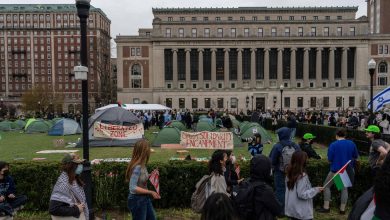Your Monday Briefing


Ukrainian Army solders patrolling the front line near Luhansk, in eastern Ukraine.Credit…Tyler Hicks/The New York Times
How will Russia invade Ukraine?
Acting on the advice of American intelligence agencies, President Biden said on Friday he was convinced that Vladimir Putin would attack Ukraine “in the coming week, in the coming days.” But how the Russian leader will do it — all at once, as senior U.S. military and intelligence officials expect, or in a series of smaller attacks — remains unclear.
One possible option is a python-like squeeze, made all the easier by the fact that Belarus is allowing Russian troops to remain indefinitely in the country, where they can menace Kyiv, the Ukrainian capital. Putin might be betting that he can shatter Ukraine’s economy and oust its government without having to roll in tanks immediately.
If Putin struck to take the whole country in a single blow, it could provoke the largest, most violent battle for European territory since the Nazi surrender in 1945. There is little question that the full package of sanctions against Russia and technology export cutoffs would be invoked almost immediately. International condemnation would follow, though it might not last.
On the ground: Russian artillery fire escalated sharply in eastern Ukraine over the weekend, deepening fears of an imminent attack and potentially giving Russia a pretext to invade. Ukrainians reluctantly left their homes, with some evacuating to Russia.
Geopolitics: Russia and China appear to be in lock step, and the U.S. is trying to build up global coalitions to counter the alliance. Experts say that Putin may be trying to revise the outcome of the last Cold War and that Russia’s troop buildup may be a sign that he has become more reckless.
Resources: Here are live updates, an explainer about the conflict and a timeline.
Queen Elizabeth II tests positive for the coronavirus
Queen Elizabeth II, Britain’s longstanding monarch, has been infected with the coronavirus, Buckingham Palace said yesterday, rattling the country she has led for seven decades. Elizabeth, who turns 96 in April, is one of several people at Windsor Castle who are infected, suggesting an outbreak at the royal residence.
“Buckingham Palace confirm that the queen has today tested positive for Covid,” the palace said in a statement. “Her Majesty is experiencing mild coldlike symptoms but expects to continue light duties at Windsor over the coming week.” Elizabeth met this month with her eldest son, Prince Charles, who later tested positive and went into isolation.
The queen has experienced other health concerns in the past year, canceling multiple public appearances and increasingly using a walking stick. Her frailty is deepening anxiety that her extremely popular reign may be coming to an end. The news came as Boris Johnson, the prime minister, prepares to introduce plans to lift remaining coronavirus restrictions in England by the end of the month.
By the numbers: Britain reported 25,696 new coronavirus cases yesterday. Nearly 1,300 people were admitted to hospitals, and 74 people died.
Here are the latest virus updates and maps.
In other pandemic developments:
-
Australia will reopen to vaccinated foreign tourists today. On March 1, Israel will also reopen to all foreign tourists, regardless of their vaccination status.
-
Hospitalizations, boosters, wastewater: U.S. health agencies have withheld key data through the pandemic.
-
Along with microchips, toilet paper and Covid tests, tech workers will be recalled as one of the great, pressing shortages of this pandemic.
-
Here’s how “long Covid” takes a toll on the body.
China’s joyless triumph at the Winter Olympics
The Winter Olympics concluded last night with athletes marching into the Bird’s Nest stadium in Beijing to the sound of Beethoven’s Ninth Symphony. For all that Chinese officials insisted that the Olympics were not about politics, but rather sports, this was the most contentious Olympics in years, haunted by controversy and scandal.
Over the past weeks, the International Olympic Committee has faced questions about the conditions for athletes who isolated after testing positive for the coronavirus; about Peng Shuai, the tennis player and former Olympian who accused a senior Chinese official of sexual assault; and about the inevitable injection of politics into an event officials hoped, perhaps futilely, would rise above them.
The most indelible memory of the Games — besides images of workers and volunteers enrobed in hazmat gear — will very likely be of the 15-year-old Russian skater Kamila Valieva’s fall on the ice after being allowed to compete despite a test showing traces of a banned heart medicine. She broke into tears, only to be berated by her coach.
Medals: Norway, which won the first gold medal of the Beijing Games and then kept on winning them for two weeks, added its 16th and final gold yesterday in the final cross-country skiing race of the Games. The country won 37 medals in total, putting it at the top of the medals table.
Capturing the moment: Gabriela Bhaskar, a photographer for The Times, documented the Winter Games on her 50-year-old Polaroid SX-70 — until the camera froze in the subzero conditions.
THE LATEST NEWS
News From Europe
-
At least one person has been found dead on a ferry that caught fire off the Greek island of Corfu on Friday. Ten others remain missing.
-
A data leak from Credit Suisse, one of the world’s most iconic banks, shows how the bank held hundreds of millions of dollars for strongmen, spies and human rights abusers, among many others.
-
Jean-Luc Brunel, an associate of Jeffrey Epstein’s who had been charged with the rape of minors, was found dead in his Paris jail cell in what appeared to be a suicide.
Other Big Stories
-
A shooting in Portland, Ore., at a protest against police killings left one person dead and five others wounded.
-
The Biden administration is pausing new federal oil and gas drilling amid a legal fight over how to weigh the cost of climate damage.
-
In Turkey, which has been hit by spiraling inflation, electricity bills have doubled in only a month, deepening the country’s economic crisis.
-
Forensic linguists believe they have identified two men as the likely sources of the QAnon conspiracy theory movement.
Animal Stories
-
A 500-pound black bear known as Hank the Tank is making a nuisance of himself in South Lake Tahoe, Calif.
-
A study of hundreds of bald eagles and golden eagles showed that nearly half of them had chronic lead poisoning.
-
Scientists have figured out the microscopic structures that allow lizards to break off their tails in an instant — or keep them firmly attached.
A Morning Read
With Omicron cases ebbing, the travel industry is looking for a significant rebound this spring and summer. One downside: Defiant Covid-era customers have been ruining flight attendants’ lives.
Here’s what to expect in the air, at the rental car counter and beyond.
ARTS AND IDEAS
Pandemic fiction
More than two years into a global health crisis that has reshaped society and daily life, Covid-19 is leaving its mark on literary fiction, Alexandra Alter reports for The Times. In a new crop of books, authors are exploring, sometimes reluctantly, the emotional and psychological reverberations of the pandemic.
Many of these pandemic-themed novels seek to capture the strange new texture of daily life: the corrosive effect of isolation, the tedium and monotony of lockdowns and quarantines, the strain on relationships, the way the coronavirus changed casual interactions and ripped some families apart and brought others together.
Gary Shteyngart’s social satire “Our Country Friends,” which I read last week on vacation, was among the earliest of these pandemic novels. But others are in the offing: Ian McEwan’s forthcoming novel, “Lessons,” follows a British man from the 1940s to his twilight years in 2021, when he’s living alone in London during lockdown, looking back on his life.
And in Isabel Allende’s “Violeta,” the narrator’s life is bookended by two pandemics: the Spanish flu and the coronavirus. “The experience of the whole planet frozen in place because of a virus is so extraordinary that I am sure it will be used extensively in literature,” the author said. “It is one of those events that mark an era.”
Though it might feel too soon to write about the pandemic, writing about anything else seems somehow harder, the author Sigrid Nunez said. “If it’s set now,” she said, “it has to be part of the story.”
PLAY, WATCH, EAT
What to Cook
Embrace a meatless Monday with this squash and wild mushroom curry.
What to Watch
Want a medical drama, a spy thriller, a snowy neo-noir? Finland’s TV industry has you covered.
Cover to Cover
How is a book made? Follow Marlon James’s “Moon Witch, Spider King” through the printing process.
Now Time to Play
Here’s today’s Mini Crossword, and a clue: “Your point is taken” (five letters).
Here’s today’s Wordle and the Spelling Bee.
You can find all our puzzles here.
Thanks for joining me today. It’s good to be back! — Natasha
P.S. Take the news quiz to see how well you followed last week’s headlines.
The latest episode of “The Daily” is about the shortage of nurses in the U.S.
What did you like in today’s briefing? What would you like to see more of? Reach Natasha and the team at [email protected].




